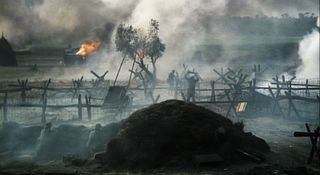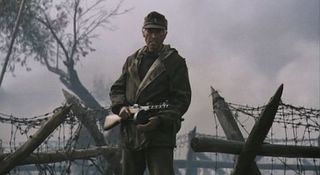Cross of Iron, the searing and shockingly violent anti-war film Peckinpah made on a shoestring in Europe in '77, is the director's only war film. That's kind of surprising when you consider how the grand themes of war - the exploitation of the lower class, a sense of duty clashing with a sense of utter defeatism, the way repeated exposure to violence eats away at people from inside - play into almost all of his movies.
It's also one of his angriest films, one of the most angry war films I've ever seen. Peckinpah hasn't made a "prayer for peace," Spielberg's description of his similarly-violent and bleak Munich. Nor has he made a film like Sam Fuller's Big Red One, in which extreme violence is meant to provide you-are-there realism and detail. Cross of Iron, in many ways, is less about the horrors of war than the evils of exploitation. Politicians and high-ranking military officers play games with the lives of thousands of soldiers. A man's honor is granted or stolen away on a whim. Long after the cause is lost, the troops continue to die, so that beurocrats can save face.
In Alfredo Garcia, anti-hero Benny comes to identify more with the poor man's corpse that he's transporting than the rich, alive man who hired him. Similarly, in Cross of Iron, a German NCO comes to sympathize more with the poor Russian soldiers at whom he shoots than the cruel Nazi Party officials and officers who send him into battle.

The fact that it's an American director working in Europe making a sympathetic movie about a Nazi soldier makes the concept even more transgressive. Sure, it speaks to larger themes, like the limited human capacity for grisly horror, forces of conformity destroying the irrepressible human spirit and the eventual futility of all prolonged military action. But really, this is a film about the class divide, suggesting thatwhat unites people is not country or custom or language, but socio-economic status.
It's not hard to see why Peckinpah might be obsessed with these sorts of themes, the disenfranchised rising up against their so-called "superiors." His reputation badly damaged by the twin box office flops Pat Garrett and Billy the Kid and Alfredo Garcia. He had all but been pushed out of Hollywood, fleeing to Europe to raise his own money for Cross of Iron. The film itself was frought with economic troubles from day one.
None of this really shows in the film itself. The action all seems credible, some of it on a surprisingly large scale. And it's not erratic or jumbled like Pat Garrett and a lot of other late-era Peckinpah. It maybe outstays its welcome for 10 or 15 minutes, leading to a powerful and nihilistic final sequence at a train yard, but the storytelling's fluid and smooth and the emotional highs and lows all effective.
As the film opens, Stranszky, a Prussian officer (Maximilian Schnell), arrives from France at the Eastern front and immediately begins to hear about a legendary Sergeant named Steiner (James Coburn). Credited with saving the lives of several of his fellow soldiers, Steiner's nonetheless disaffected, dour and pessimistic about the war. He and the vain, self-absorbed aristocrat Stranszky will come to represent the binary opposition of all modern social conflicts - the powerful who make decisions, and the unpowerful who will live with the consequences of these decisions.

Steiner and his superior officer, Brandt (James Mason), have essentially given up on their Fuhrer's dream of the 1000-Year Reich controlling all of Europe. They focus exclusively on keeping themselves and their men alive. Stranszky goes through the motions of a loyal Nazi enthusiast, but is himself only in Russia for personal glory. He says he cannot go home and face his family unless he earns the Iron Cross for bravery.
These personal conflicts play out against some impressive and very brutal action sequences, including a fight against Russian tanks that surely inspired the final battle scene in Saving Private Ryan. More so than usual, Peckinpah trains his camera on the gory aftermath of violence. The Getaway features a lot of slow-motion shots of men being shot, with stage blood spraying out all over the place. But that's nothing compared to the lingering shots of corpses cut apart by barbed wire, of limbs being blown asunder by mortar fire, of dessicated bodies being pushed into mud by tank treads in Cross of Iron.
One scene finds Stranszky walking through a medical ward, feigning deep concern for all the wounded soldiers. He goes to shake on man's hand before discovering that it's nothing but a stump. So he reaches for his other hand, only to find that it's a stump as well. So, he gives up and moves on. Hey, sorry about that, fella, but we've got a war to win.
Coburn's really fantastic here, giving Steiner the same weary, faraway demeanor as Pat Garrett in his previous collaboration with Peckinpah. The only problem is his horrible and inconsistant accent. If you can't do it really well, and keep it up for the whole film, just don't bother. (He has some of the same problems maintaining his Irish accent in Duck, You Sucker, but his German's even worse).
Still, the scenes with him, Mason and David Warner (as another German officer) form the backbone of the film and crackle with energy. "You think I hate you less than the other officers?" Steiner barks. "I hate you all. All officers. The entire German Army." He's grown tired of being a cog in a machine, but at this point, it's all he's fit to do. His entire life consists of the act of grinning and bearing it, and his smile's beginning to fade.

Great movie. Glad to see a real company has released this. The previous DVD was full frame!
ReplyDeleteNow...where's the CONVOY DVD?
the second greatest war film ever made, only elim klimov`s "come and see" is a better film, and to put that into an even clearer context, klimov`s film is itself second only to kubrick`s "barry lyndon" on the all time list of all genres. That might help you to realise what a supreme masterwork peckinpah`s "cross of iron" really is !!!.
ReplyDelete